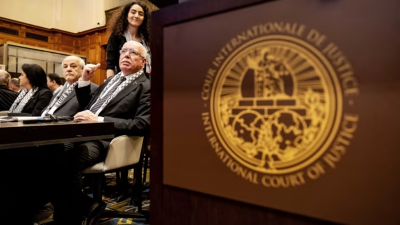Context
The International Court of Justice (ICJ) is currently conducting public hearings regarding Israel's actions in Gaza, following a request by the UN General Assembly for an advisory opinion. The hearings, which began on February 19, focus on two key questions: the legality of Israel's occupation, settlements, and annexation of Palestinian territories since the 1967 war, and the consequences of Israel's discriminatory policies towards Palestinians. This issue has led to a divide between Western countries, which generally support Israel's actions as self-defense, and countries from the Global South, particularly Brazil and South Africa, which seek judicial accountability for Israel's actions.
|
About International Court of Justice (ICJ) The International Court of Justice (ICJ), often referred to as the World Court, serves as the primary judicial organ of the United Nations (UN). Established in June 1945 by the UN Charter, it commenced its operations in April 1946. Situated at the Peace Palace in The Hague, Netherlands, it stands as the only principal UN organ not located in New York, United States. Hearings held by the ICJ are always open to the public. With official languages being French and English, the ICJ holds powers and functions that encompass two main categories of cases. Firstly, it serves as a mediator in "contentious cases" between two member states, addressing disputes related to various issues such as land and maritime boundaries, territorial sovereignty, non-use of force, violations of international humanitarian law, non-interference in internal affairs, and diplomatic relations. Secondly, the ICJ can provide advisory opinions upon request from UN bodies or specialized agencies, offering legal clarity on matters pertinent to their lawful functioning and authority over member states. While the Court's judgments in contentious cases are final and binding on the involved parties without recourse to appeal, advisory opinions are not binding. In its adjudication process, the ICJ applies international law derived from conventions, customary practices, general principles recognized by civilized nations, judicial precedents, and the writings of distinguished experts in international law. |
ICJ Hearings and Key Speakers
The ongoing ICJ hearings involve testimony from various countries and international organizations, with Palestine and South Africa playing prominent roles. Palestinian Foreign Minister Riyad al-Maliki delivered a strong condemnation of Israel's actions, accusing the government of ethnic cleansing, apartheid, and genocide. Other speakers from the Global South, including Brazil and South Africa, have echoed these sentiments, calling for the ICJ to declare Israel's actions illegal. In contrast, Western countries, including the United States and the United Kingdom, have defended Israel's right to self-defense but faced criticism from countries like Ireland for disproportionate use of force.
Brazil's recent condemnation of Israel's actions has escalated tensions between the two countries, leading to Brazil recalling its ambassador from Israel. This rift underscores broader divisions within the international community regarding Israel's actions in Gaza. While some countries, like India, have abstained from taking a public stance, others from the Global South have been vocal in their criticism of Israel's policies.
India's Position
India's position on the Israel-Gaza conflict is complex due to various factors, including its historical support for Palestinian rights and its growing defense cooperation with Israel. While India has voted in favor of UN resolutions critical of Israel's actions, it has refrained from publicly condemning Israel and has maintained diplomatic relations with the country. India's stance is influenced by its ties with both the Arab world, which expects solidarity on the Palestinian issue, and Israel, with which it has strategic defense partnerships.
Despite pressure from both sides, India has opted to remain relatively neutral, abstaining from taking a strong public stance on the ICJ hearings. This approach allows India to balance its competing interests while avoiding direct confrontation with either Israel or its Arab allies. However, India's position may come under scrutiny as it seeks to assert its leadership in the Global South, where many countries are united in their criticism of Israel's actions in Gaza.
Conclusion
The ICJ hearings on Israel's actions in Gaza have highlighted the deep divisions within the international community regarding the conflict. While Western countries tend to support Israel's right to self-defense, many countries from the Global South, led by Brazil and South Africa, are calling for judicial accountability for Israel's actions. India, caught between its support for Palestinian rights and its defense cooperation with Israel, has adopted a cautious approach, abstaining from taking a strong public stance. However, as tensions continue to rise and pressure mounts from both sides, India's position may become increasingly difficult to maintain.
|
Probable Questions for UPSC Mains Exam
|
Source – The Hindu







